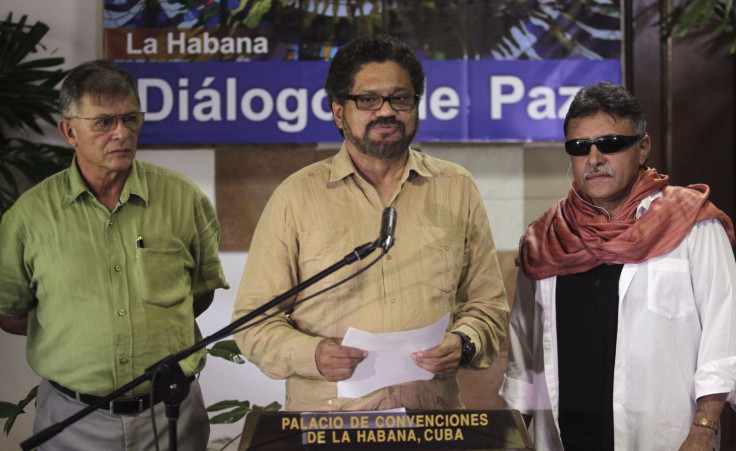13th Time’s A Charm? Colombia's President Juan Manuel Santos Tries To Make Peace With The FARC, Again

Never give up: that seems to be the motto behind Colombia’s President Juan Manuel Santos attitude towards the Revolutionary Armed Forces of Colombia (FARC), the guerrilla movement that has been terrorizing the country for almost half a century. Reaching peace with the group has been a priority for Santos since he took office, and the negotiations that started Monday in Havana will be the 13th meeting his cabinet has held to reach an agreement with the terrorist group.
The negotiations, which have been going on for nine months, are pursuing the ultimate goal that the armed group take part in the political life of the country, once they stop the violence. Iván Márquez, second in command of the FARC, publicly recognized that the group had “hurt” Colombia and caused thousands of victims, an admission never before made by the guerrillas. Márquez said that the group was open to a “total reparation to the damage, loyal to peace and reconciliation.”
Throughout its history, the FARC had never admitted to committing crimes against civilians, claiming that its members were “fighters for the people.” One of the group’s main negotiators, Jorge Torres Victoria a.k.a. Pablo Catacumbo, assured that the group had the responsibility to restore peace and compensate the victims of its violent acts. “We are willing to work for the collective pardon, and when and if peace is reached, we all promise to ‘never again’.”
Nevertheless, Catacumbo also assigned blame with the Colombian government. “The enemy was never easy, they never followed combat rules,” he said.
Since the FARC was created in 1958, the conflict has left 220,000 victims, of which 176,000 were civilians, according to a report by the Colombian Centro Nacional de Memoria Histórica (Center for Historic Memory). According to the report, 3 out of 10 Colombians who died in the last half-century were because of the guerrilla.
The FARC also made it clear that it did want to participate in the political life of Colombia, asking for Congress representation and participation in local governments, as reported by Colombian newspaper El Tiempo.
The Colombian government is open to giving FARC a voice in political matters, a position that is not shared by 80 percent of Colombians, according to a survey published by polling service Gallup Colombia. Whereas seven out of 10 Colombians support the negotiations, most of the population do not want to see FARC in the political life. The armed group was rejected altogether by 65 percent of Colombians.
Former FARC member Yezid Arteta, who is currently a conflict analyst based in Madrid, explained to Spanish newspaper El País that although the group is managed by urbanites, it is still mainly a farm and jungle movement. This decentralization makes them deeply disconnected with the reality of the cities, where public opinion is formed. “In the rural areas, nobody questions whether FARC should have representation -- they think it’s a given,” he said.
© Copyright IBTimes 2024. All rights reserved.





















